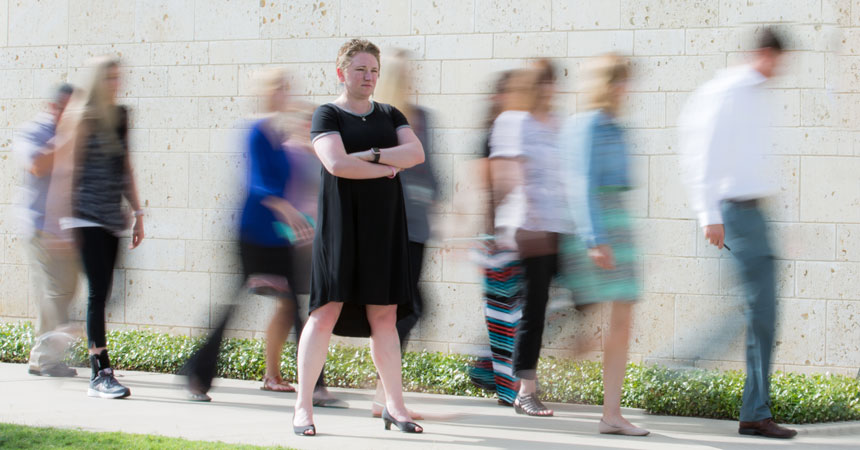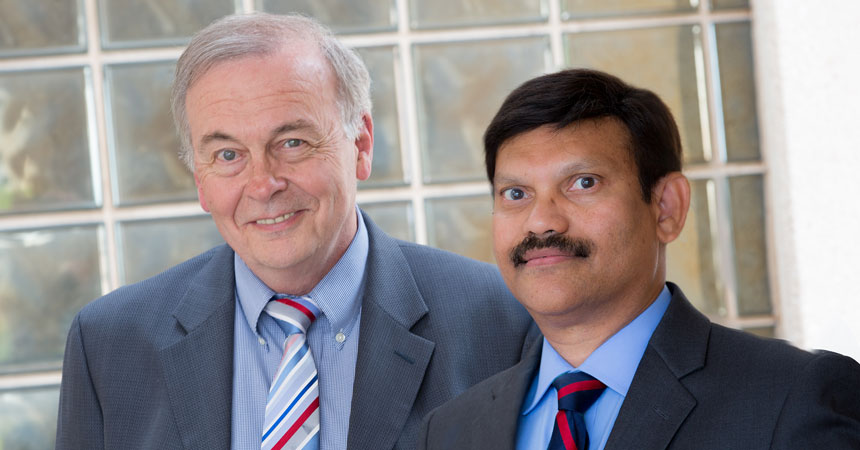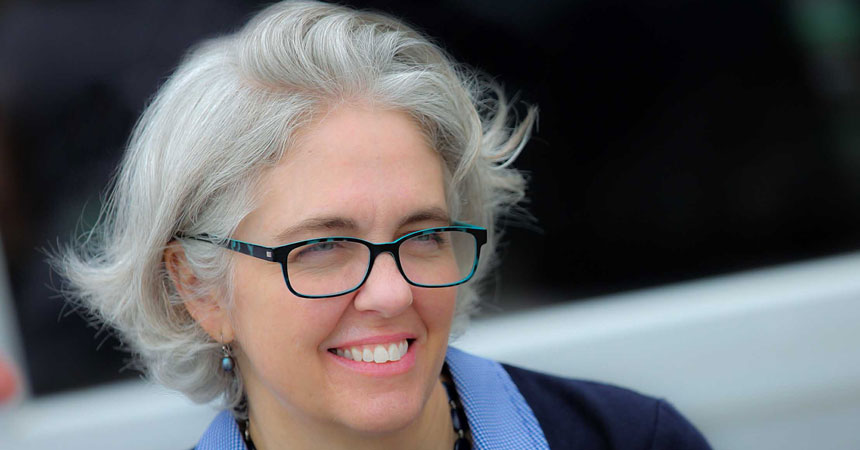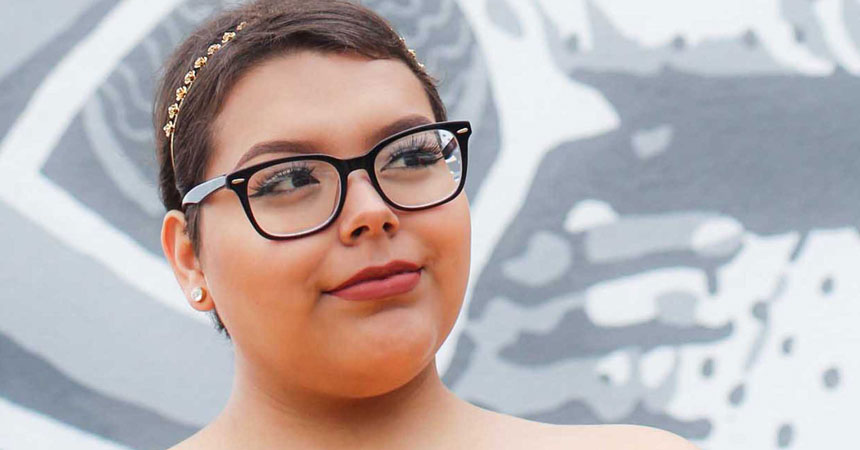Supporting young adults with cancer
By Alex Branch

Courtney Parker, a 32-year-old high school teacher, was breastfeeding her infant daughter when she felt a pea-sized lump.
Her mind instantly lurched to cancer, but a visit to her doctor calmed her. Breast feeding often causes changes in breast tissue. The doctor performed a mammogram and ultrasound and suggested they observe the lump for a couple months.
Solutions magazineRead more about UNTHSC’s people and programs in the latest issue of Solutions. |
Two months later, the lump was so large that Parker could see it in the mirror. She underwent a biopsy. While driving her daughter to daycare one morning, the doctor called.
Parker had an aggressive form of Stage 3 breast cancer.
“I dropped my daughter off, drove to school, sat in the hallway and cried on my friend’s shoulder until my husband got there,” said Parker, who teaches social studies in Eagle Mountain Saginaw School District.
Parker is one of an estimated 70,000 adolescents and young adults between the ages of 15 to 39 who are diagnosed with cancer in the U.S. each year. While that accounts for only 6 percent of all cancer diagnoses, this age group is diagnosed eight times more often than pediatric cancer, according to the National Cancer Institute.
Because they are younger than the typical adult cancer patient and older than the typical pediatric cancer patient, adolescents and young adults can fall into a medical gray area. Their treatment plans must consider unique factors, such as biological differences, fertility and parenting, as well as social, educational and professional challenges.
Providing better care and support to patients like Parker is the focus of a partnership between the UNT Health Science Center and the Fort Worth AYA (Adolescents and Young Adults) Oncology Coalition, a nonprofit foundation made up of healthcare providers, service organizations and more than 100 healthcare professionals, cancer survivors, caregivers and volunteers.
“A lot of the time, younger people with cancer are treated like hot potatoes,” said W. Paul Bowman, MD, UNTHSC Chairman of Pediatrics and Women’s Health. “Oncologists who usually treat older adults aren’t as familiar with cancer diagnosis and management in younger adults, but neither are pediatric oncologists who are accustomed to treating children.
“The result can be a patient bouncing around between providers and no one sufficiently focused on their specific needs.”

Innovative registry
Young adults and adolescents are far less likely to get cancer than adults in their 50s, 60s and 70s. But when they do, their prognosis is often worse.
Researchers do not fully understand why, Dr. Bowman said. However, several likely factors include:
- Biological differences: The genetic nature of cancer in young adults may make it more aggressive or drug resistant.
- Delayed diagnosis: Young adults and their physicians may not suspect cancer as the cause of obscure symptoms so diagnoses are often delayed, giving the cancer time to spread.
- Treatment compliance: Adolescents may rebel and refuse treatment. Young adults, independent and adjusting to autonomy, may be less likely to follow their treatment plans.
Investment in pediatric cancer research and specialized training for caregivers has greatly improved survival rates in children. But a similar emphasis has not been placed on the AYA population.
Young adults tend to have the lowest enrollment rates of any age group for clinical trials that could identify new life-saving treatments, according to the American Cancer Society.
That’s the focus of a $150,000 grant from the Joe and Jessie Crump Foundation to the Health Science Center. UNTHSC, in partnership with the AYA Coalition, is developing an innovative registry that will track incidence of cancer and outcomes for adolescents and young adults to enhance research and identify improved delivery of care for patients.
The registry will be accessible to caregivers across North Texas. As a leading academic research institution, the Health Science Center was a natural home for the research aspects of the project, said Karen Albritton, MD, the AYA Coalition’s Medical Director.
“The partnership with the Health Science Center is a key part of eventually achieving our vision of ensuring that every young adult cancer patient in our community receives the highest standard of comprehensive and age-appropriate care,” she said.

Unique challenges
The unique challenges that adolescents and young adults face after cancer diagnoses go beyond a lack of research.
Because young adults often lack longevity in their employment, they have a harder time taking extended time off. Some are finishing high school, in college or hoping to get pregnant.
“Some of the things that are very important to a 60-year-old with cancer are often very different from things that are important to a 25-year-old,” Dr. Albritton said.
Parker, and her husband Andrew, had always planned to have a second child so their 2-year-old daughter, Blair, would have a sibling. But chemical-induced menopause was part of her treatment.
“We looked into freezing my embryos before I started treatment so we could eventually try to have a second child,’ Parker said. “But we didn’t want to delay my chemotherapy and risk waiting any longer.
“It’s a decision you never in your life consider yourself having to make. Of course, you never expect to be 32 years old with a toddler and wondering if you will be alive in a year either.”

Social isolation
Young adults and adolescents often feel out of place at cancer treatment facilities.
A 17-year-old cancer patient is surrounded by young children in a pediatric center while a young adult draws sad or confused looks from older patients at an adult center.
“The older patients there would say ‘Oh, but you are so young’ or ‘I thought you were here visiting your mom,’” said Kim Jones Penepacker, who was diagnosed with lymphoma in December at age 25. “And they mean well. But eventually you just want to say ‘Yes, I know, I’m young. And it didn’t help!’”
Reducing the social isolation is among the AYA coalition’s goals. Cook Children’s Medical Center and Baylor Scott & White All Saints Medical Center Fort Worth have both created spaces designed specifically for young adults and adolescents. Among the features are libraries, study areas, USB charging ports, lounges and spaces for yoga and meditation.
Laura Rutledge, whose daughter Carley was diagnosed with Ewing’s sarcoma at age 15, founded the Rutledge Cancer Foundationin 2011 to raise money for cancer research and supportive services for young people with cancer and their families.
The foundation has funded innovative cancer treatment research at UNTHSC and provided funding to the Moncrief Cancer Institute/ Rutledge Foundation Fertility Preservation Program. It also organizes social events like bowling nights, outings to Texas Rangers games and retreats.
This year, nearly 400 people attended the foundation’s rodeo night for young adults with cancer.
“After my daughter was diagnosed, she described it as feeling like everyone else’s lives kept going while hers came to a complete halt,” Rutledge said. “We try to help these young people get a break from their stress, relax, share stories and encourage each other.”
Jessica Orona Bernal, a 17-year Trimble Technical High School student, was diagnosed with leukemia last summer before her junior year. The loss of social activity that followed devastated her.
“I was always the person at school being around people, laughing with friends and doing usual teenage stuff,” she said. “Once I got sick, I had to be homeschooled and it was just me and my teacher sitting at the kitchen table.
“Sometimes it’s so hard not to feel alone and mad.”






Social media